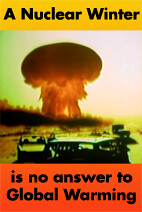Did someone say hot?
It is official: 2005 was the hottest year on record (ABC News) in Australia. I'm not surprised, considering Melbourne got to 42.9 degrees Celsius on New Year's Eve (which is hot for December).
I expected to watch the government and fossil fuel industries try to squirm and spin themselves out of this one. Will they sign the Kyoto Protocol? Not likely. But I am surprised at Federal Minister Ian Cambell's response to this news: he has 'declared' the debate over global warming over, and accepts it is a reality! I'd be intrigued to see where he (and the government) takes this.
We got ourselves Tim Flannery's The Weather Makers for Christmas. I have only dipped into the book so far (got lots of things to occupy us during the silly season), but he makes the case on CO2 and global warming quite extensively and cogently, I can't believe there are still naysayers. If you need to be convinced, or need to keep informed so that you can fend of that 4WD bore at a party sounding off about greenies, read it!
More importantly, Flannery makes some convincing arguments that what we need to do and can do to tackle global warming are effective and achievable – and can be done sooner rather than later.
What can you do? Flannery's list of 11 things that each person can do to help reduce the impact of CO2 emissions on global warming is on the book's accompanying website here.










7 Comments:
I was disappointed with the ABC story, in that it gives no source - a common problem with the ABC science section. I have no doubt that the data is well sourced (probably CSIRO) but a simple link would take up little space and be of great benefit to those of us who like to interpret this type of data for ourselves.
As the story stands, we do not know how much hotter 2005 was, or even "how much hotter than what?"
We also cannot know how (or if) the data used has been adjusted to take into account some basic problems that will be raised by any skeptic. For example, we cannot know that they have adjusted for the heat sink effect of the cities where much of this data comes from (all that concrete is of course making the Melbourne CBD hotter than it was a century ago).
The biggest problem is that no attempt was made to put the data into the perspective of the 100 year trend. The BBQ debates will therefore be based on a one-off event, which is generally not very helpful.
I have not seen the Flannery book as yet, but am curious as to what he thinks of Kyoto. After all, with regard to IPCC projections, Kyoto would only buy us 6 years in a hundred. Has he fallen for the Nuclear argument?
David
A quick update - I now see that the ABC tell us that "The Bureau of Meteorology is releasing figures today showing the average temperature last year was 22.89 degrees".
My comments stand regarding the benefits of providing a link to the report so that the above questions may be answered, but at least I can now search the BoM site for it.
David
The link:
http://www.bom.gov.au/announcements/media_releases/climate/change/20060104.shtml
I agree that the ABC generally is slack in providing links to other web sources or sites in its online news stories. But I find their news generally more reliable than the commercial alternatives.
On wheather they adjusted the temparature figures for the urban heat sink affect or considered the 100 year context, I don't know. But I did hear a BOM guy on TV last night (ABC...) arguing that there was no El Nino effect to factor in for 2005, and compared to previous record years that were affected by El Nino, global warming would have to be a strong consideration for last year's record temparatures!
I haven't got far enough into Flannery's book, but I don't believe he has bought the nuclear argument. He tends to advocate solar and wind power, fuel efficiency in the home, and hybrid cars, as fosil fuel alternatives and minimisers.
In this extract from his book published in The Age, he tends to take a 'weighing-up all sides' approach to nuclear, and then puts an argument for geothermal instead, and supports solar and wind because it allows power generation to be decentralised to citizens!
Oh, and on David's point that cities are hotter because of the concrete, steel and glass, and so temparatures should be adjusted, I gave some more thought to the fact that some inland Victorian towns got hotter on New Year's Eve. In fact, I think Melbourne's position on Port Phillip Bay – sea breezes and a southerly position – may mitigate the temparatures down...
Things are hotter in inland Australia! The Bureau has hundreds and thousands of weather stations to select its data from.
Now all we need is a meteorolgist or geographer to join in our little discussion...
And the answer is - cold tea!
http://www.guardian.co.uk/climatechange/story/0,12374,1677586,00.html
Even more climate friendly without cream and sugar....or tea.
Hhmmm. One of the reasons we switched from an electric kettle to a gas-stove top one is to cut down our electricity bill.
I can only guess that the gas stove emits less CO2 etc.
I know people love a good, fresh hot cuppa, but perhaps we should take a lesson from the Chinese, who make a batch of tea and keep it warm in a thermos for the rest of the day...
And cycle more...
Post a Comment
<< Home